I went to dinner with a colleague after a vegfest. Another couple joined us and their enthusiasm about the Whole Food Plant-Based Diet was palpable. It had changed their lives.
This was a Middle Eastern restaurant with a section on the menu marked “Vegetarian” and listing ingredients. My friend and I ordered with only minimal tweaks. Then the other woman ordered a chicken dish, and the gentleman a dish with lamb. Probably because my jaw fell to the table, the man explained, “We’re not vegan. We’re plant-based.”
vegan |ˈvēɡən| noun – person who does not eat or use animal products: I’m a strict vegan.
adjective – using or containing no animal products: a vegan diet.
ORIGIN 1940s: from veg[etari]an.
I’m aware that “plant-based” has no agreed-upon definition. It can mean vegan with no oil, or vegan with no processed foods, or vegan with no oil, processed foods, sugar, or salt. Or, without the “whole food” modifier, it can simply be a synonym for vegan. It can also mean mostly vegan with some grass-fed butter – “Come on, how can you live without butter?” — or eggs from backyard hens. Another interpretation is what we used to call “flexitarian” – eating largely, but not exclusively, from the plant kingdom, like the couple with whom I spent that surprising evening.
I’m not the vegan police. Anyone who moves in the direction of consuming more plants and fewer animals is helping to save both animals and the planet. Those who consume more plants, fewer animals, and less fragmented, highly processed food are also making tremendous strides toward improving their own health. And yet, it seems to me, we need some baseline, something that tells us – and the world — who we are: individuals who may disagree on many topics, dietary and otherwise, but who stand firm in one conviction: We do not consume death.
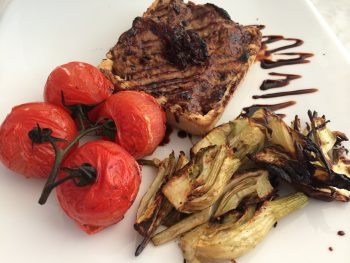
It’s pretty simple. We want the food that we eat to impart life to our bodies, so the first requirement for a food item’s passing muster needs to be that it is life-giving. This goes beyond its ability to provide certain nutrients. The lamb my tablemate consumed that evening provided nutrients — protein, fat, iron, vitamin B12. But if we’re about holistic health, we need to look at the whole picture, at foods that will nourish every part of us: body, mind, spirit, and planet. The planet part may sound like a stretch, but our physical bodies are made from elements of Mother Earth, so it follows that our health, in any true sense, depends on hers.
With these parameters in place, the only foods that can count as health-promoting are the offerings of the plant kingdom. These contain measurable nutritional components, including vitamins and antioxidant phytochemicals, and a powerful and positive psychological effect comes from eating plants instead of animals, too. Almost everyone who does this reports not just improvement in physical wellbeing, but also a sense of freedom, lightness, and peace.
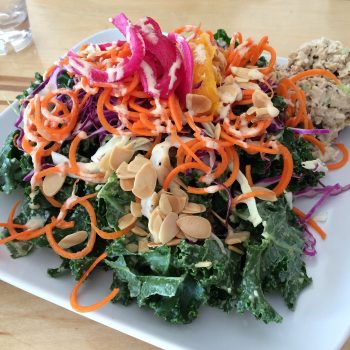 So, what would it mean if we accepted as a baseline, We do not consume death. This means that we would all be vegetarian and eventually vegan. People used to get stuck in vegetarianism (“You can’t expect me to give up cheese!”) but that rarely happens anymore. Men, women (and, increasingly, children) either go vegan overnight or in stages, but they go vegan. When we understand the nature of animal agriculture, eggs and dairy reek of death – male chicks killed mere minutes after hatching, boy calves slaughtered for veal, spent milk cows slaughtered for cheap meat.
So, what would it mean if we accepted as a baseline, We do not consume death. This means that we would all be vegetarian and eventually vegan. People used to get stuck in vegetarianism (“You can’t expect me to give up cheese!”) but that rarely happens anymore. Men, women (and, increasingly, children) either go vegan overnight or in stages, but they go vegan. When we understand the nature of animal agriculture, eggs and dairy reek of death – male chicks killed mere minutes after hatching, boy calves slaughtered for veal, spent milk cows slaughtered for cheap meat.
By not consuming death, we enliven our bodies and minds, and we join with millions of others around the world who share this conviction. What if health people, animal people, environmentalists, yogis, Seventh Day Adventists, raw-food folks and everyone else seeing the light on this issue were willing to come together as vegans? There could be modifiers. We used to say “dietary vegan” or “health vegan” to show a distinction from “ethical vegan.” Even now we hear “gluten-free vegan” and “raw vegan.” Why not whole food vegan? It’s so clear.
When you think about it, it’s not so different from saying “I’m a reform Jew,” or “Yes, I am Christian – Lutheran.” This states one’s specific identity as far as religion, and also places the person within the context of a larger body of people carrying considerable political and economic clout. Don’t we want to have that level of influence in the sphere of food and agriculture? We can – if we stop sweating the small stuff (“I saw olive oil in her kitchen!”) and join forces with our allies. I can hear the arguments:
“But vegans eat junk food!” Some do. And some plumbers pad their bills, some soccer moms gossip, and some teenagers are out of control. To lump every member of these groups together beneath a negative umbrella is both unfair and inaccurate. And so what if someone eats something you don’t? They’re still an ally.
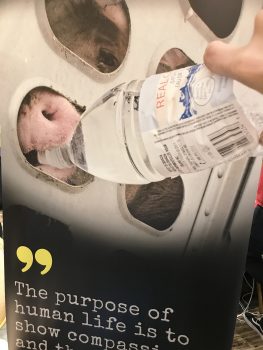 “But I’m not an animal rights activist!” Since 2014, the number of Americans who identify as ”vegan” has grown by 600%. This surge includes animal rights proponents, health seekers, eco-advocates, and more. If you’re not particularly interested in animals, don’t be interested. You’re contributing to their wellbeing simply by choices you’ve made for yourself. And if someone assumes that because you’re a vegan, you care about non-human animals, what’s the harm in that?
“But I’m not an animal rights activist!” Since 2014, the number of Americans who identify as ”vegan” has grown by 600%. This surge includes animal rights proponents, health seekers, eco-advocates, and more. If you’re not particularly interested in animals, don’t be interested. You’re contributing to their wellbeing simply by choices you’ve made for yourself. And if someone assumes that because you’re a vegan, you care about non-human animals, what’s the harm in that?
“But the book I read calls this diet ‘plant-based’!” I know. And another calls it “plant-strong.” And another has a different term. We’re creative people. We come up with variations on this theme. The problem with plant-based is, I contend, “based.” If I told you that my nephew attended a math-based school, you’d presume that its curriculum contained more math than a standard school’s – maybe 15% more, maybe 50% more. You wouldn’t think that it was math-exclusive – no English, no history, no art. It’s the same with a plant-based diet. There’s so much room for conjecture that those outside our community – the people we want most to reach – have no idea what we’re talking about.
I entered this movement back in the days when ethical veganism, in the U.S. anyway, came curated via the American Vegan Society and its powerful voice, the late H. Jay Dinshah. He said that Natural Hygiene, a healthy living movement, was the flip side of veganism, enabling vegans to stay healthy and strong. I learned from Natural Hygiene concepts that are more valuable to me now, in my sixties, than they were in my twenties: to eat lots of colorful produce, much of it raw, and to sustain a host of non-dietary health practices, too. This background makes being a health-embracing and ethical vegan seem entirely natural to me.
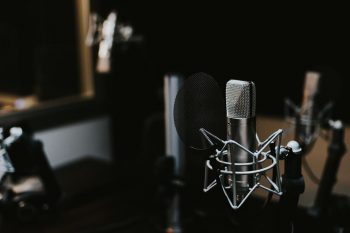 On my weekly Main Street Vegan radio show/podcast, I interview health authorities, animal rights rock stars, environmental crusaders, and chefs, cookbook authors, and entrepreneurs. Many of these produce or promote vegan foods that I myself choose not to eat, but I can still be grateful that these products exist, because changing the marketplace changes the world.
On my weekly Main Street Vegan radio show/podcast, I interview health authorities, animal rights rock stars, environmental crusaders, and chefs, cookbook authors, and entrepreneurs. Many of these produce or promote vegan foods that I myself choose not to eat, but I can still be grateful that these products exist, because changing the marketplace changes the world.
And Main Street Vegan Academy, training and certifying Vegan Lifestyle Coaches and Educators, is a virtual laboratory of vegan diversity. Five times a year, twenty women and men come together from across the U.S. and from twenty-three other countries so far. Their eating style may be WFPB, raw, macrobiotic, Ayurvedic, Nutritarian, Starchitarian, gluten-free, oil-free, or I-eat-anything-as-long-as-no-animals-were-harmed. And we get along. We even eat together. Our instructors teach every aspect of vegan living and vegan outreach. No one is expected to abandon what they came with, but simply to leave with an understanding that there are myriad ways to craft a vegan life. Everybody wins when we respect them all.
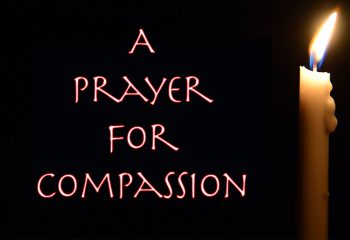
Victoria Moran (www.mainstreetvegan.com) is the author of thirteen books including Main Street Vegan, The Love-Powered Diet, The Good Karma Diet and, with JL Fields, The Main Street Vegan Academy Cookbook. She is the founder and director of Main Street Vegan Academy, host of the Main Street Vegan podcast, and producer of the upcoming documentary, A Prayer for Compassion, to introduce vegan living to people of faith. (Note: This article was written to appear in Health Science Magazine, the membership journal of the National Health Association. Their 70th anniversary conference is happening in Cleveland June 30-July 1.)

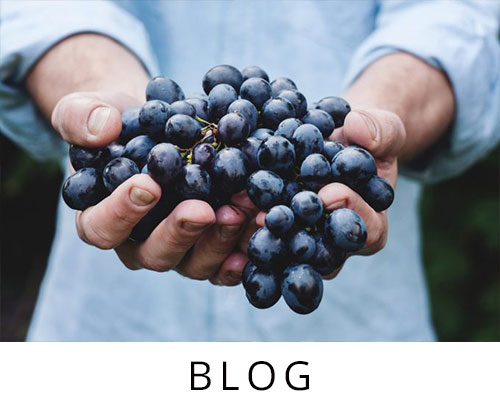
What a wonderful article, Victoria! You are very insightful, logical, and compassionate in your approach to veganism, and you show a deep understanding of the confusion that pervades not only society in general, but also those of us who are vegan.
Before I became a vegan, I was morbidly obese and had some chronic health problems that could not be resolved any other way. Adopting a vegan diet resulted in over 160 pounds weight loss and the total disappearance of my health problems, including the Type 2 Diabetes. I did NOT, however, call myself a vegan , but “plant based” instead. Why? Because of the extremely negative image that I had of vegans. If I mentioned that I was eating vegan for health reasons, I often got the response that “then, you are not a vegan. You don’t care about the animals. You might as well eat meat”. Unfortunately, this attitude is still very prevalent in the vegan ranks.
I now very proudly proclaim myself as VEGAN. And I try to present a positive impression of our way of life. I DO care about the animals, at least as much as any vegan. What I see among the “animal lover” faction of veganism is a very strong impression that though they may love animals, the seem to hate their fellow human beings. They are angry and aggressive toward those who don’t share their identical mindset. We need to be compassionate to ALL living beings.
Another major problem, that you so clearly point out, is the total confusion over terminology. It is difficult to obtain a vegan meal when the server thinks that fish or chicken is vegan, or that vegans can’t eat gluten. They have served customers who are so confused themselves about what a vegan, or plant-based diet, is that they make it very difficult to get a handle on who we really are, and what we eat as true vegans.
I definitely agree with your idea that a baseline for veganism should be “We do not consume death”. But I would also feel uncomfortable making that statement to the poor young, confused server taking my order. It would sound confrontational. I usually just say that “I don’t eat animals or animal products – meat,dairy, eggs, etc.” . But there are many circumstances in which I will now definitely say “I don’t consume death”, because that approach would be beneficial in truly defining what consumption of animals and animal products truly is. What a wonderful phrase – “We do not consume death”.
I have read your “Main Street Vegan” book, and am on your mailing list. I would love get certified through your program, but just can’t afford it. But I am a major advocate for vegan living, I refer many people websites of those vegan educators that I respect (including you), and as an RN, I have the opportunity to do a significant amount of nutritional counseling.
Keep on doing things the way you do. You are a marvelous ambassador for vegan living. And, of course, “The Sexiest Vegan Over 50”. I couldn’t resist saying that. I am totally Politically Incorrect, and at 72-years-old and happily married for 52 years, I could care less! 😉
Thank you, Ryan. This means so much.
Such a thoughtful and insightful article, Victoria. I know what you mean. I was recently at a local vegan Meetup event, and spent a lot of time talking to a woman who was trying to become vegan. She was overwhelmed and kept asking me what I eat, exclaiming that she hasn’t had anything other than plain beans and rice and raw vegetables for 2 weeks. Healthy but maybe not so tasty, I remarked. She said, “Well I’m not supposed to eat salt…right?!” Or oil. Or too many nuts, etc etc. Basically, she read some whole foods plant based books and got super confused about WHAT she can eat, assuming that salt & oil etc. must not be part of the vegan diet. I had to explain that she CAN add those to her diet, if she wants and doesn’t have a doctor saying no for some reason, and that vegan simply means no animal products— all else is on the table. And of course, I had to tread gently, given half the table is WFPB and kept remarking how long they’ve been oil free. No wonder she’s confused. (You should have seen her face when we told her she can make creamy sauces out of cashews and ice cream out of bananas— it was like Christmas Day! :). It actually made me a little grateful I started on my vegan journey just several years ago, before everyone and their vegan brother has a diet theory and recipe blog! Lol. All the choices and theories are good— but I agree with you about wishing we kept the focus on our alikeness.
I also find the use of plant-based very tricky, because so many people use “vegan” when they are more technically plant-based, like your dinner companions. Case in point, all the I’m not a vegan anymore blogs— IMO, those folks were plant based because they made their choices whether to stop eating animals and/or start again based on nutrients and foods and cravings, whereas even vegans who care about those things really believe it’s wrong to consume animal foods regardless. I went through a period where I thought I should consider “loosening” up my “vegan diet” some, for various health insecurities (that were probably unfounded and based on reading too many non-veg blogs). I ate a couple eggs. I immediately felt sick and started crying. It was awful. I knew in that moment I was vegan, for life. For the animals. The foods I eat must stem from that belief, not the other way around.
With the word vegan being attached to so many foods or recipes etc, it’s cool on one hand because the word is becoming a household term and becoming a lot less alien than when I first got on this journey. My hope, though, is that the word ultimately serves as an invitation for folks to go beyond food and recipes and think about humanity’s use of animals on a broader scale, and whether they believe it is truly necessary. Which is what veganism seeks to examine and devise a code of ethics from. Veganism includes food but it’s about SO much more than food. And definitely not about whether you use oil in your salad dressing or not.
Anyway, your article sparked these thoughts, I didn’t realize I’d write a tome! I love all your work, thank you!
I appreciate this, Jennifer — thank you.
I echo Robert’s praise and would like to add that I left a book club, that I started, because the conversation was about what is better: lamb, rabbit or deer meat?” I never impose by beliefs, but that was so disrespectful to me! I am a vegan because I can put my head on my pillow with a clear conscience!
Amen to the clear conscience!
I would love to say I’m vegan (because for the past 7 years, I haven’t eaten any animal products at all) but have been told by “real vegans” that I’m not vegan enough to use that term because I haven’t completely found my way yet to completely eliminating every single item in my make up bag and clothes closet that may contain animal products. I eat a WFPB diet because of my health, sure of course, but I ALSO love that this way of eating helps the environment and the beautiful animals which inhabit it. I originally found the vegan community to be more restrictive in the usage of the word “vegan” but now I can see the WFPB community being elitist if people eat sugar, oil and salt. So, I’m not sure what word to use.
It gets complicated, doesn’t it? I hope somehow we’ll all be able to come together and see that there is room for all of us — and time for all of us to learn from one another. Thanks for reading and commenting.
Loved your article so much. As an ethical vegan, I am tired of many vegans avoiding the elephant in the room. ‘ We do not cosume death’ as a statement is so definin. Thank You. While there is a notion that vegans are judgemental, I have seen that it is those who eat meat who jump to conclusion and shame vegans. I was at a healers summit where I was asked why I am a vegan and when I listed ethical reasons everyone jumped on me because it amde them guilty. Many spiritual healers who believe in seven realms try to tell that all forms have life etc conveniently forgetting sentience. Offlate I rarely see vegans even talk about the ethical side of it for the fear of putting people off and I am glad to read your thoughts. Many use plant based in place of vegan because vegan leads to preconcieved notions but i felt that alone defines well a positon where you dont eat meat or any anima product. Rest are all sketchy
Thanks, Vinaya. I appreciate your thoughtful comments. The spiritual healing and New Age community in general is very down on vegans. I think it is because they think they have all the answers already, when the fact is, none of us has all the answers. Keep up your beautiful work and your beautiful spirit.